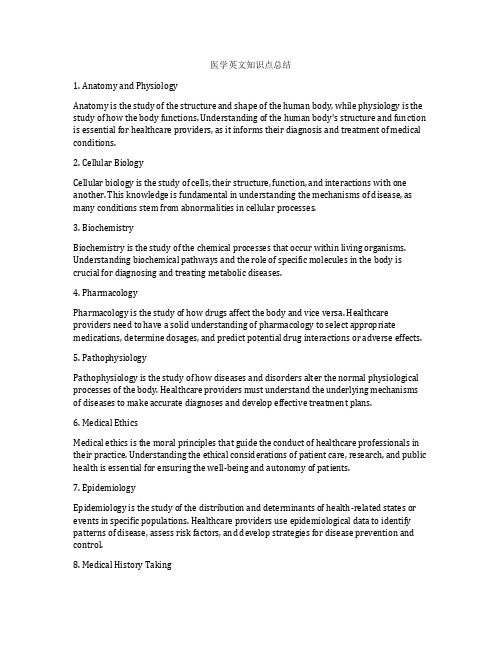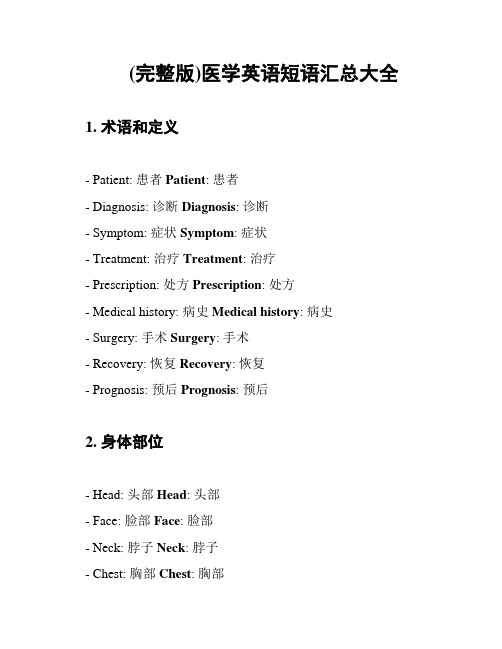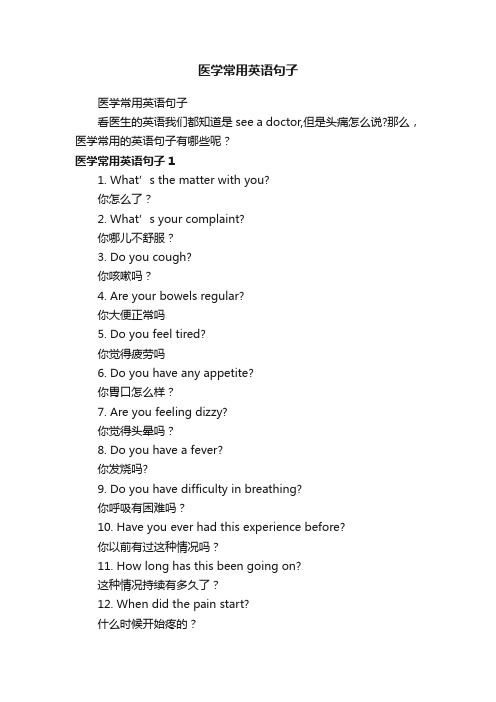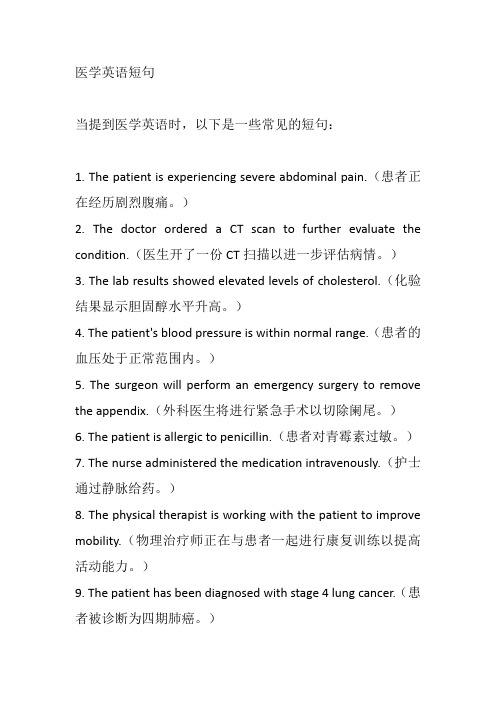医学文献英语 常用句型
医学英语文献阅读单词

Unit One1. neuron 神经2. office visit(诊所)就诊3. scan 扫描4. medical practice 行医5. blood pressure 血压6. maintenance(健康)保持7. mammogram 乳房X线8. physical 身体9. side effect 副作用10. panic 恐慌11. practicing 执业12. transplant 移植13. budget 预算14. tablet 药片15. childproof 防孩子16. randomized 随机17. allocation(随机)分配18. prognosis 预后19. control 对照20. follow-up 跟踪21. ward 病房22. hepatitis 肝炎23. malaise 身体不适24. metabolism 代谢25. liver 肝26.pathophysiology 病理生理27. literature 文献28. investigation 调查29. incidence 率30. epidemiology 流行病学31. bed rest 卧床休息32. hospital stay 住院33. jaundice 黄疸34. course 病程35. intravenous 静脉注射36. diastolic 舒张37. perfusion 灌注38. primary 初级39. bypass(冠脉)旁路40. informed 知情41. humanitarian 人道主义42. the Red Cross 红十字会43. relief 援助44. casualty 人员伤亡45. emergency 紧急Unit Two1. re-emerging 再现2. strain 变种3. vaccine 疫苗4. infectious 传染性的5. emerging 新出现6. prevention 预防7. plague 鼠疫8. pathogenic 病原的9. authorities 机构10. drug resistanc 抗药性11. course 疗程12. scarlet fever 猩红热13. virulence 毒性14. pandemic 大流行15. antigen 抗原16. genetic 基因的17. neurological 神经性18. immunity 免疫力19. infrastructure 基础设施20. case 病例21. swine 猪22. tuberculosis 结核23. morbidity/incidence发病率24. professionals 专业人士25. latent 潜伏26. skin test 皮试27. screening 筛查28. interferon 干扰素29. toxicity 毒性30. curable 可治愈的31. intractable 难治的32. pathogen 病原体33. ulcer 溃疡34. exposure 接触(带病者)35. recombination 重组36. bioterrorism 生物恐怖活动37. foodborne 生物传播Unit Three1. adrenaline 肾上腺素2. residency 实习3. autoimmune 自身免疫4. stamina 持久力5. transient 短暂的6. bedridden 卧床不起7. building block 基本构件8. model 模型9. neurodegeneration神经退化10.excrete 排除(毒素)11.optimize 优化12.load 载量13.relapse 复发14.self-experimentation自我实验15.trial 试验16.neuromuscular 神经肌肉17.therapist 治疗师18.micronutrient 微量营养素19.function 功能20.track 跟踪21.coordination 协调22.cardiovascular 心血管23.rapport 亲密24.synchronization 同步25.contagion 传染26.regulate 调节27.psychobiological 生物心理28.solace 慰藉29.imaging MRI30.activate 激活31.mandatory 强制性32.dubious 无把握的33.background 背景34.concept 概念35.regimen 方案plications 并发症37.anti-tumor 抗肿瘤38.standard 标准的39.pharmacological 药理学的40.solubility 溶解性41.in vivo 体内Unit Four1. complementary 补充2. alternative 替代(医学)3. paradigm 模式4. acupuncture 针灸5. adjunct 辅助6. nausea 恶心7. post-operative 术后8. clinical 临床的9. physicaltherapy 理疗10. therapeutic 治疗(方法)11. intervention 干预12. design 设计13. resonance 共振14. emission 发射PET15. analgesia 止痛16. establishment(生物医学)界17. rehabilitation 康复18. licensed 持照(针灸师)19. strategies 策略20. formulas 配方21. wide array 各式各样的22. integrative(中西医)结合23. acute 急性的24. administer 给药25. procedure 程序26. evaluation 评估27. prevalence 患病率28. conventional 传统(疗法)29. evidence-based 循证的30. management(压力)处理31. peripheral 外周/外围32. mechanisms 机制33. reductionistic 还原式的34.cost-effectiveness 效益35. outcomes 结果36. preclinical 临床前37. plausible 可能的38. manipulative 推拿39. homeopathic 顺势40. naturopathic 自然(疗法)41. meditation 冥想Unit Five1. crisis 危机2. symptoms 症状3. vitality 活力4. immune 免疫5. virus 病毒6. lifestyle 生活方式7. robust 健全的8. fragile 脆弱的9. balance 平衡10. spiritual 精神的11. blockages 路障12. repressed 被压抑的13. genuine 真实的(真情实感)14. physiological 心理15. integrated 整合的(十全十美)16. decaying teeth 蛀牙17. nutrition 营养18. waistline 腰围19. bottled 瓶装(水)20. intake 摄入21. appetite 食欲22. protein 蛋白质23. obesity 肥胖症24. lean 精益的(蛋白质)25. dietary 饮食(习惯)26. quality 质量27. dairy 乳制品28. diabetes 糖尿病29. content 含量Unit Six1. nursing home 养老院2. hospice 临终(关怀)3. failure(心)衰4. available around-the-clock24小时随叫随到5. coronary 冠心病6. respond(对治疗有)反应7. facility 机构8. end-of-life 终末期9. comfort 舒适的(护理)10. hospital discharge 出院11. care(症状)护理12. palliative 姑息的13. fatal illness 绝症14. pulmonary 肺的COPD15. experimental 实验性的16. advisors 顾问17. discontinue 终止18. dialysis 透析19. smear 涂片20. provider 医患关系21. care-as-usual 常规医护22. preventive 预防性23. beaten 常用的off the beatenpath 离开熟路,另辟蹊径24. moldinto the shape 塑形25. renew 重新开始to renew aprescription 照旧处方再开药26. fertilization 授精27. basic 基础的(生物学)28. stem cell 干细胞29. collaborate 合作30. test-tube 试管(婴儿)31. reproductive 生殖的32. hormones 激素33. immature 未成熟的34. empirical 经验(观察)35. pioneering 首创的36. endoscope 内镜37. ethical 伦理的38. concern(社会)关注39. infertile 不孕不育的40. inherited 遗传性的41. fibrosis 纤维化42. dilemmas 困境Unit Seven1. station(护士)站2. life-support 生命维持(系统)3. measures 护理措施4. withdraw 停止(治疗)5. paternalistic 家长式的6. empowerment 授权7. ethicists 伦理学家8. principles 准则9. ideal 理念10.patient-centered以病人为中心的11. autonomy 自主权12. options 选择13. exclusivepurview 专属的(领域)14. emergency 紧急(决定)15. restraint 限制16. anxiety 焦虑17. transgression 违背18. practice(家庭)医疗19. metastases(广泛)转移20. aggressive 积极的21. primary 原发22. follow-up 随访23. record 病历24. embolism 栓塞25. tomography 断层摄像CT26. infiltrates 浸润27. chest 胸28. lower-lobe 左下叶29. labored(呼吸)困难30. team 团队31. chronic 慢性的32. psychosocial 社会心理33. guidelines 指南34. implement 实施(治疗方案)Unit Eight1. subject 受试对象2. biomedical 生物医学3. therapy 治疗4. protocol 方案5. beneficence 有利6. justice 公正7. autonomous 有自主能力的8. diminished 减弱Diminished autonomy 自主性减弱9. exposed to 面临10. Oath 誓言11. distribution 分配12. consent 同意Informed consent 知情同意13. procedures 程序14. operating 手术台15. obligation 责任16. pediatric 儿科的17. perform 做(手术)18. flow(血)流19. intensive 重症的ICU20. adoptive 义(父)21.biological 生(父)22. psychological 心理的23. medical 医学的24. occupational 职业的25. contract 感染性的26. infection 感染27. blood vessel 血管28. circulation 循环29. welfare 安宁30. disapprove 不批准31. protocol 研究计划32. liability 责任Unit Nine1. curriculum 课程2. community 界The medicaleducation community 医学教育界3. expectations 期待4. attributes(个人)品质5. value 看重The place value on 看重6. maladies 疾患7. diagnostic 诊断的8. manifestations 临床表现9. civic mindedness 民本意识10. chatter 闲谈11. manner(临床)举止12. directories 名录13. integral 不可分割的14. underserved 服务匮乏的15. shortage(初级保健)缺乏16. certification 证书17. address 应对(需要)18. basics 基础知识19. teaching 教学(医院)20. academic 学术的21. affiliate with 隶属于22. continuing medicaleducation继续医学教育Unit Ten1. coverage 范围medical coverage 医疗保险支付范围2. Medicaid 医疗救助3. single-payer 单一支付4. subsidize 补贴5. deliver 提供6. duplicative 重复的7. sustained 长期的8. deficits(视力)缺陷9. echocardiogram 超声心动图10. thrombus 血栓11. stroke 中风12. artery 动脉13. intracranial 颅内的14. cerebral 大脑15. bleeding 出血16. brain-stem 脑干17. recovery 恢复18. ventilation 通气19. anticoagulant 抗凝血20. infusions 输液21. surgeon 外科医生22. administrators 管理者23. ambulances 救护车24. elective 可做可不做25. infarction 梗死26. time-critical 时间要求紧迫的27. arrest 停止28. traumatic 外伤的,创伤的29. intervention 介入术30. multi-payer 多家支付的31. universal 全民的32. for-profit 以营利为目的的33. pharmaceutical 制药的34. remedies 治疗方法home-brewed remedy 自创的治疗方法35. out-of-pocket 自掏腰包的。
医学英文知识点总结

医学英文知识点总结1. Anatomy and PhysiologyAnatomy is the study of the structure and shape of the human body, while physiology is the study of how the body functions. Understanding of the human body's structure and function is essential for healthcare providers, as it informs their diagnosis and treatment of medical conditions.2. Cellular BiologyCellular biology is the study of cells, their structure, function, and interactions with one another. This knowledge is fundamental in understanding the mechanisms of disease, as many conditions stem from abnormalities in cellular processes.3. BiochemistryBiochemistry is the study of the chemical processes that occur within living organisms. Understanding biochemical pathways and the role of specific molecules in the body is crucial for diagnosing and treating metabolic diseases.4. PharmacologyPharmacology is the study of how drugs affect the body and vice versa. Healthcare providers need to have a solid understanding of pharmacology to select appropriate medications, determine dosages, and predict potential drug interactions or adverse effects.5. PathophysiologyPathophysiology is the study of how diseases and disorders alter the normal physiological processes of the body. Healthcare providers must understand the underlying mechanisms of diseases to make accurate diagnoses and develop effective treatment plans.6. Medical EthicsMedical ethics is the moral principles that guide the conduct of healthcare professionals in their practice. Understanding the ethical considerations of patient care, research, and public health is essential for ensuring the well-being and autonomy of patients.7. EpidemiologyEpidemiology is the study of the distribution and determinants of health-related states or events in specific populations. Healthcare providers use epidemiological data to identify patterns of disease, assess risk factors, and develop strategies for disease prevention and control.8. Medical History TakingTaking a thorough and accurate medical history is essential in diagnosing and treating patients. Healthcare providers must ask targeted questions to gather information about a patient's symptoms, medical history, family history, and social history.9. Physical ExaminationConducting a systematic and comprehensive physical examination is essential for assessing a patient's overall health. Healthcare providers must be proficient in techniques such as inspection, palpation, percussion, and auscultation to identify abnormalities and make accurate diagnoses.10. Diagnostic TestingInterpreting diagnostic tests such as blood work, imaging studies, and electrocardiograms is essential for diagnosing and monitoring medical conditions. Healthcare providers must understand the indications for specific tests, their limitations, and the interpretation of results.11. Clinical Decision MakingClinical decision making involves synthesizing patient information, medical knowledge, and available evidence to make informed choices about patient care. Healthcare providers must weigh the risks and benefits of treatment options and involve patients in shared decision making.12. Patient CommunicationEffective communication with patients is essential for building trust, conveying information, and involving patients in their care. Healthcare providers must use clear, empathetic, and culturally sensitive communication to ensure patient understanding and engagement.13. Patient EducationPatient education is crucial for empowering patients to manage their health and participate in treatment decisions. Healthcare providers must provide relevant information about medical conditions, treatment options, lifestyle modifications, and self-care strategies. 14. Preventive MedicinePreventive medicine aims to reduce the incidence and impact of disease through health promotion, disease prevention, and early detection. Healthcare providers must understand risk factors, screening guidelines, and immunization schedules to promote primary and secondary prevention.15. Interprofessional CollaborationInterprofessional collaboration involves working with other healthcare professionals to optimize patient care. Healthcare providers must effectively communicate, coordinate care, and respect each other's expertise to achieve positive patient outcomes.16. Patient SafetyPatient safety involves addressing the risks, errors, and harm in healthcare to prevent adverse events and promote a culture of safety. Healthcare providers must implement strategies to improve medication safety, prevent healthcare-associated infections, and reduce diagnostic errors.17. Quality ImprovementQuality improvement involves systematic efforts to enhance the effectiveness, efficiency, and safety of healthcare delivery. Healthcare providers must use data-driven approaches to identify and address opportunities for improvement in patient care.18. Global HealthGlobal health focuses on improving health and achieving equity in health for all people worldwide. Healthcare providers must understand the social, economic, and environmental determinants of health to address global health challenges such as infectious diseases, non-communicable diseases, and health disparities.19. Medical ResearchMedical research aims to advance knowledge in healthcare and improve patient outcomes. Healthcare providers must understand research methodology, scientific evidence, and ethical considerations to critically appraise research findings and apply them to practice.20. Healthcare PolicyHealthcare policy involves the development and implementation of regulations, laws, and programs to improve the delivery, quality, and cost-effectiveness of healthcare. Healthcare providers must understand healthcare policy to advocate for patients, promote health equity, and address healthcare disparities.In conclusion, a comprehensive understanding of medical knowledge points is essential for healthcare providers to provide high-quality, safe, and effective care to patients. Continual learning and application of these knowledge points are crucial for improving patient outcomes and advancing the field of medicine.。
医学英语常用句子

医学英语常用句子第一篇:医学英语常用句子医学英语常用句子(一)2013.11.251.What can I do for you?(What’s the trouble with you? What's the wrong with you?)你有什么事?2.May I help you?(Can I help you?)我能帮你什么忙吗?3.Please take a seat!Please sit down!请坐下。
4.Wait a moment, please.Just a minute, please.请等一等。
5.Sorry to have kept you waiting.对不起,让你久等了。
6.It is not(so)serious.病情不严重。
7.Don't worry.There is nothing to worry about.不必顾虑。
8.You need a thorough examination.你需要做一个全面检查。
9.You will have to stay in hospital for several days.你需要在医院里住几天。
We think that you had better be hospitalized.我们认为你最好住进医院来。
10.You should stay in bed for a few days.你需要卧床几天。
第二篇:医学英语写作万能句子万能句子及作文解析(一)作文解析纵观历年真题及各类模拟作文题目,简单的可将作文类型分为以下三种。
欢迎补充1、现象+ 讨论型开篇给出一种现象,由此展开讨论,代表题目有:《转基因食品》,《SARS防治经验谈》《亚健康》2、观点+ 讨论型开篇给出观点,由此展开讨论,代表题目有:《医学与健康》《医疗保险》《安乐死》3、现象举例题通篇给出许多事例,观点在结尾或贯穿给出。
代表题目有:《生活方式》《中国人的体质问题》等(二)万能句子1、开篇句子IRecently, there has been in China a heated discussion on the labeling of genetically modified food.The focus is : is GM food safe?Therefore, it is of great importance to discuss the aim of medical science under such circumstances.Recently, there has been an alarming speculation that physical constitution of the Chinese is declining.2、开篇句子ⅡThe essay below discusses two recent discoveries about how to live a long life.This article reveals a blind zone in child-raising which deserves correcting and calls for a well-balanced diet for children.3、开篇句子ⅢIt seems that the daily life of many middle-aged males in China is like this: rushed or no breakfast, car driver to work …There are many strange phenomena that…such as4、开篇句子ⅣIt has been widely accepted that the earlier cancer is detected and treated ,the better.第三篇:医学英语:看医生常用词汇及句子医学英语:看医生常用词汇及句子看医生的英语我们都知道是see a doctor,但是头痛怎么说?发烧怎么说?如何表达具体症状呢?下面跟小编一起来学习看医生常用英语词汇及句子吧!常用看医生词汇:have a cold 感冒have a cough 咳嗽headache 头痛have a stomachache 胃痛have a toothache 牙痛have a fever 发烧allergy 过敏pneumonia 肺炎medication 药物pills 药丸see a doctor 看病have an operation 动手术recover 复原,痊愈常用看医生句子:I feel sick,I want to see a doctor.我觉得不舒服,我想去看医生。
(完整版)医学英语短语汇总大全

(完整版)医学英语短语汇总大全1. 术语和定义- Patient: 患者Patient: 患者- Diagnosis: 诊断Diagnosis: 诊断- Symptom: 症状Symptom: 症状- Treatment: 治疗Treatment: 治疗- Prescription: 处方Prescription: 处方- Medical history: 病史Medical history: 病史- Surgery: 手术Surgery: 手术- Recovery: 恢复Recovery: 恢复- Prognosis: 预后Prognosis: 预后2. 身体部位- Head: 头部Head: 头部- Face: 脸部Face: 脸部- Neck: 脖子Neck: 脖子- Chest: 胸部Chest: 胸部- Abdomen: 腹部Abdomen: 腹部- Back: 背部Back: 背部- Limbs: 四肢Limbs: 四肢- Joints: 关节Joints: 关节- Muscles: 肌肉Muscles: 肌肉- Bones: 骨骼Bones: 骨骼- Skin: 皮肤Skin: 皮肤- Nervous system: 神经系统Nervous system: 神经系统3. 疾病和病症3.1 常见疾病- Cold: 感冒Cold: 感冒- Fever: 发烧Fever: 发烧- Headache: 头痛Headache: 头痛- Cough: 咳嗽Cough: 咳嗽- Sore throat: 喉咙痛Sore throat: 喉咙痛- Stomachache: 胃痛Stomachache: 胃痛- Diarrhea: 腹泻Diarrhea: 腹泻- Allergy: 过敏Allergy: 过敏3.2 疼痛描述- Sharp pain: 刺痛Sharp pain: 刺痛- Dull pain: 钝痛Dull pain: 钝痛- Burning sensation: 灼热感Burning sensation: 灼热感- Throbbing pain: 跳动痛Throbbing pain: 跳动痛- Soreness: 酸痛Soreness: 酸痛- Aching pain: 隐痛Aching pain: 隐痛- Stinging pain: 刺痛感Stinging pain: 刺痛感3.3 伤病与治疗- Fracture: 骨折Fracture: 骨折- Sprain: 扭伤Sprain: 扭伤- Burn: 烧伤Burn: 烧伤- Cut: 切口Cut: 切口- Infection: 感染Infection: 感染- Suture: 缝合Suture: 缝合- Bandage: 绷带Bandage: 绷带- Physical therapy: 物理治疗Physical therapy: 物理治疗- Medication: 药物治疗Medication: 药物治疗- Referral: 转诊Referral: 转诊4. 医疗程序和设备- Intake form: 问诊表Intake form: 问诊表- Medical examination: 体检Medical examination: 体检- Blood test: 血液检查Blood test: 血液检查- X-ray: X光X-ray: X光- Ultrasound: 超声波Ultrasound: 超声波- MRI: 磁共振成像MRI: 磁共振成像- CT scan: CT扫描CT scan: CT扫描- Operating room: 手术室Operating room: 手术室- Intensive care unit: 重症监护室Intensive care unit: 重症监护室- Ambulance: 救护车Ambulance: 救护车- Stethoscope: 听诊器Stethoscope: 听诊器- Syringe: 注射器Syringe: 注射器- Scalpel: 手术刀Scalpel: 手术刀5. 表达方式和交互- How can I help you?: 我能帮助你吗?How can I help you?: 我能帮助你吗?- What seems to be the problem?: 出什么问题了?What seems to be the problem?: 出什么问题了?- Please describe your symptoms: 请描述您的症状Please describe your symptoms: 请描述您的症状- Take deep breaths: 深呼吸Take deep breaths: 深呼吸- Lie down on the examination table: 躺在检查台上Lie down on the examination table: 躺在检查台上- Open your mouth: 张开嘴巴Open your mouth: 张开嘴巴- Does it hurt when I press here?: 我按这里会痛吗?Does it hurt when I press here?: 我按这里会痛吗?- Follow-up appointment: 复诊预约Follow-up appointment: 复诊预约- Take this medicine three times a day: 每天三次服用这个药Take this medicine three times a day: 每天三次服用这个药以上是医学英语的常用短语汇总,希望对您有所帮助。
医学常用英语句子

医学常用英语句子医学常用英语句子看医生的英语我们都知道是 see a doctor,但是头痛怎么说?那么,医学常用的英语句子有哪些呢?医学常用英语句子11. What’s the matter with you?你怎么了?2. What’s your complaint?你哪儿不舒服?3. Do you cough?你咳嗽吗?4. Are your bowels regular?你大便正常吗5. Do you feel tired?你觉得疲劳吗6. Do you have any appetite?你胃口怎么样?7. Are you feeling dizzy?你觉得头晕吗?8. Do you have a fever?你发烧吗?9. Do you have difficulty in breathing?你呼吸有困难吗?10. Have you ever had this experience before?你以前有过这种情况吗?11. How long has this been going on?这种情况持续有多久了?12. When did the pain start?什么时候开始疼的?13. How’s your sleep?睡眠怎么样?14. What did you eat yesterday?你昨天吃什么了?15. Do you bring up any phlegm?你有痰吗?16. Does your phlegm have any blood?你痰里有血吗?17. Have you had any chills or fever?你有没有寒颤或发热?18. Does anyone in your family suffer from hypertension?你家里有人患高血压吗?19. Have you lost any weight recently?你最近体重减轻了吗?20. Are you allergic to anything?你对什么过敏吗?医学常用英语句子21.I don’t feel well, doctor.医生,我觉得不舒服。
医学英语作文常用动词

医学英语作文常用动词在医学英语作文中,使用恰当的动词可以使文章更具说服力和清晰度。
以下是一些常用的医学英语作文中常见的动词:1. Diagnose 诊断。
Doctors diagnose illnesses based on symptoms and medical tests.医生根据症状和医学检查来诊断疾病。
2. Treat 治疗。
Physicians treat patients using various methods such as medication, surgery, or therapy.医生使用各种方法治疗患者,如药物、手术或治疗。
3. Prescribe 开药方。
Doctors prescribe medications to alleviate symptoms or cure diseases.医生开药方来缓解症状或治疗疾病。
4. Monitor 监测。
Nurses monitor patients' vital signs to ensure their condition is stable.护士监测患者的生命体征以确保他们的情况稳定。
5. Administer 管理,施行。
Nurses administer medications to patients according to the doctor's orders.护士按照医生的嘱咐给患者服药。
6. Evaluate 评估。
Physicians evaluate the effectiveness of treatmentsthrough regular examinations and tests.医生通过定期检查和测试评估治疗的有效性。
7. Document 记录。
Healthcare professionals document patients' medical history and treatment plans.医护人员记录患者的病史和治疗计划。
医学英语论文摘要常用句型

医学英语论文摘要常用句型1)表达论文内容的常用句型A 第三人称主动态①This paper(article,report)describes…本文叙述…②This paper (article)reports…本文报告…③This report(paper,article)presents…本文介绍…④This paper(article,report)discusses…本文讨论…常用的动词还有analyze(分析),evaluate(评价),compare(比较),describe(描述)等。
B 第一人称主动态⑤We report(on)…我们报告…⑥We describe a case of…我们描述1例…⑦In this paper,we present…本文介绍…⑧In this paper,we report…本文报告…主语除we之外,还可用the authors(作者)等。
C 一般现在时被动语态⑨A case is reported in which…本文报告1例…⑩A study of…is reported本文报告…的研究⑧…is(are)described.本文描述…⑥In this paper.…is(are)presented.本文介绍…2)表达目的常用句型A 一般过去时、被动语态①The purpose(aim,objective) of this study was to…本研究旨在…②The goal(aim) of this investigation was to…本研究旨在…③This study was designed to…本研究旨在…④This study was undertaken to…本研究旨在…⑤This prospective study was performed to…本前瞻性研究的目的是…⑥A study to…was carried out(during) (在…期间)所作研究的目的是…⑦An attempt has been made to…为了…而作试验B 动词不定式短语To evaluate,report,investigate,study,analyze…C 一般过去时、主动语态⑧We(the authors)conducted a study to…为了…我们进行了研究⑨To determine…,we studied…为了确定…,我们研究了…⑩In an attempt to…,in an effort to…或in order to…,we carried out a pilot study…为了…,我们进行了…的初步研究表示目的的常用动词有:evaluate(评价),examine(检查,观察),determine(确定,查明),elucidate(阐明),explore(探索),test(测试),compare(比较),estimate(评估),assess(估价),investigate(调查)等。
医学英语短句

医学英语短句当提到医学英语时,以下是一些常见的短句:1. The patient is experiencing severe abdominal pain.(患者正在经历剧烈腹痛。
)2. The doctor ordered a CT scan to further evaluate the condition.(医生开了一份CT扫描以进一步评估病情。
)3. The lab results showed elevated levels of cholesterol.(化验结果显示胆固醇水平升高。
)4. The patient's blood pressure is within normal range.(患者的血压处于正常范围内。
)5. The surgeon will perform an emergency surgery to remove the appendix.(外科医生将进行紧急手术以切除阑尾。
)6. The patient is allergic to penicillin.(患者对青霉素过敏。
)7. The nurse administered the medication intravenously.(护士通过静脉给药。
)8. The physical therapist is working with the patient to improve mobility.(物理治疗师正在与患者一起进行康复训练以提高活动能力。
)9. The patient has been diagnosed with stage 4 lung cancer.(患者被诊断为四期肺癌。
)10. The doctor prescribed antibiotics to treat the infection.(医生开了抗生素来治疗感染。
)这些短句可用于描述和交流医学领域的情况和信息。
请注意,医学英语需要准确和专业,因此在实际应用中,确保准确性非常重要。
